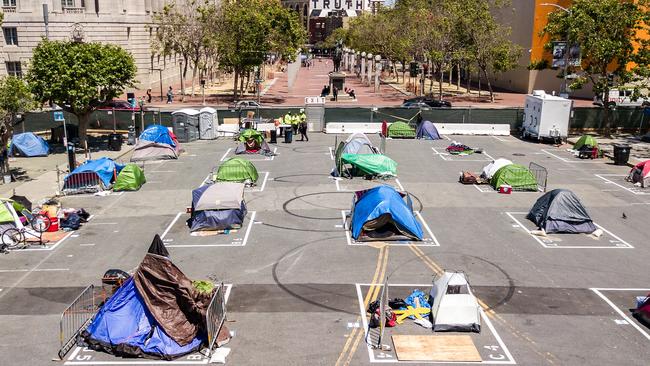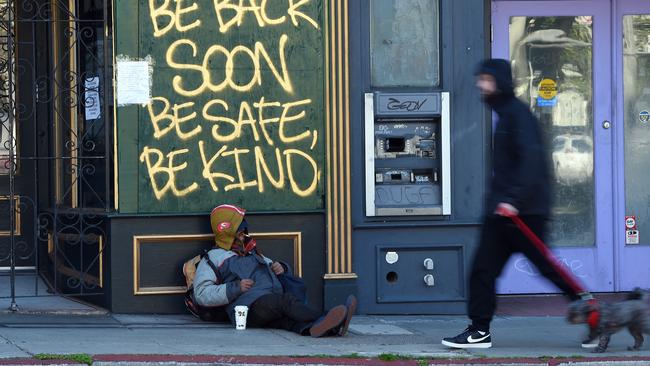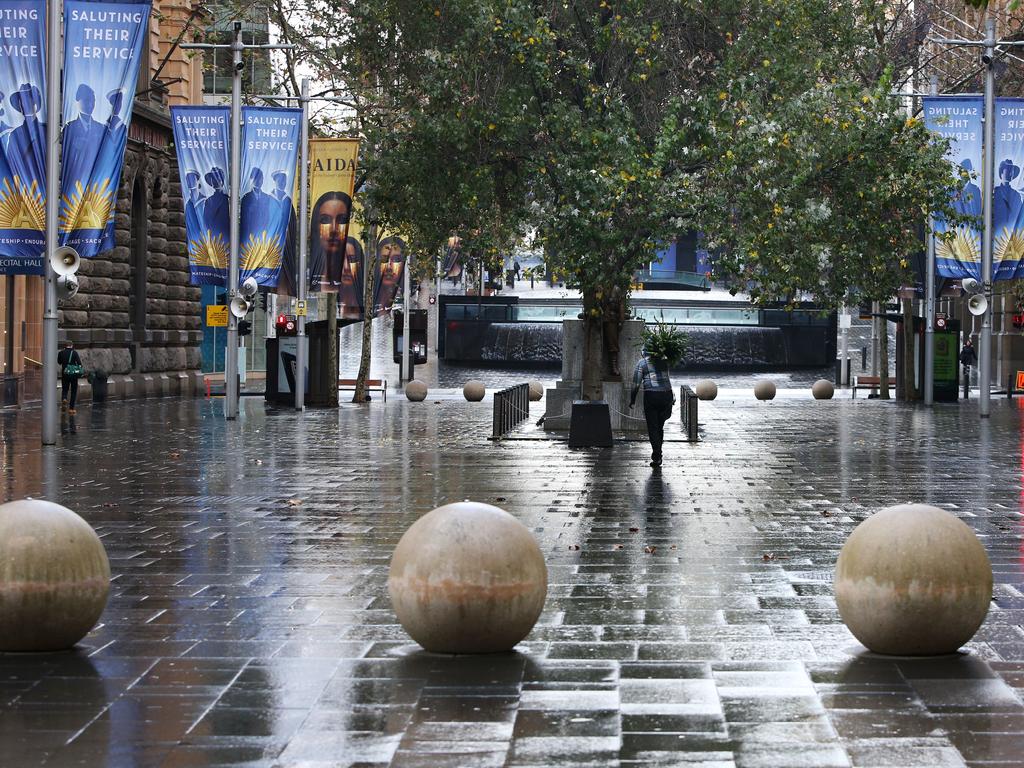Shock of the Bay: Watching San Francisco’s tide of despair roll in
Black Lives Matter flags everywhere alongside rampant homelessness and drug use. San Francisco seems at first glance to be a woke dystopia as it opens up after Covid-19.

But walk a little further, up the steep hills to Alamo and Lafayette parks, and it’s clear why America’s tech elite make “SF” their home: stunning terraces, gorgeous parks and magnificent water views that rival the best Sydney can offer.
The BLM movement, however popular, clearly has a lot of work to do in “SF”, as the locals call it.
Homelessness, overwhelmingly African American, rose 17 per cent to about 8000 over the two years to 2019, according the official figures. The annual counts have been suspended for two years owing to the pandemic, but the homeless ranks have swollen significantly as soaring housing costs, the spread of drugs, and a surge in unemployment push more people onto the streets.
Imagine the population of Parkes, in regional NSW, around 11,200 people, sleeping rough between Sydney’s Circular Quay and Martin Place. I couldn’t sit on a park bench without being harassed for money or cigarettes.
Drugs are the No.1 cause of homelessness. More than 750 people are expected to overdose in the city this year based on the current trend, which would be triple the level of 2017, according to a report by the San Francisco drug-dealing task force released this week.

“It’s ground zero for the drug trade: a hands-off policy means we’ve got a coalescence of drug users and suppliers, everyone knows the chance of being arrested is very low,” says Lee Ohanian, a senior fellow at the Hoover Institution at nearby Stanford University.
In late 2014, Californian voters passed “proposition 47”, which decriminalised illicit drug use and a host of other misdemeanours including petty theft.
“Pharmacies such as Walgreens and CVS are routinely robbed now, and there are basically no consequences – go online and check out the videos.” Ohanian adds.
Use of fentanyl, a powerful synthetic opioid coming mainly from China, has become rife.
“When paramedics go out on a call they have to wear hazmat suits to prevent inhalation it’s so dangerous,” Ohanian says.
The response to the pandemic in California didn’t much affect the city’s highly paid elites, many of whom enjoyed the permanent shift to “WFH” and higher disposable income it brought – but it was a disaster for the city’s poor.
“More people died from overdosing than died from Covid-19,” Ohanian points out.
San Francisco County, with some 890,000 residents, has recorded 555 Covid-19 deaths, compared to 24,000 in Los Angeles, about a fifth the death rate.
The longest, hardest series of lockdowns across US states fuelled increased poverty and inequality, destroying low-income service jobs and even cutting off access to water at restaurants and cafes which the homeless had used to wash their hands.
The city is in the process of building suicide prevention nets on its famous Golden Gate Bridge.
“Street cleaning and the breaking up of encampments stopped, and shelters weren’t an option anymore because they would increase transmission of the virus, so people were left on the streets,” says Sarah Hunter, a senior social scientist at the not-for-profit RAND Corporation.
Meanwhile, the wealth explosion has driven up housing costs, making San Francisco the most expensive city in the US. Monthly rent for a modest, one-bedroom, 60sq m apartment is now more than $US3000 ($4015) a month.
“Any one with a normal wage can’t really afford to live there. The wealth gap here is you’re either at the top or you’re at the bottom,” Hunter says.
Far from hurting during the pandemic, many tech workers benefited, ensuring that the city witnessed the biggest increase in inequality in the US. The wealth of nine of the top tech barons in the US rose by more than $US350bn during the pandemic. The stock prices of Facebook and Google, two companies headquartered in the SF Bay area, more than doubled. No other US city has so many workers on seven-figure incomes.
It doesn’t look like homelessness levels will be falling anytime soon.
“The thing that is really needed is more housing but that’s the last thing rich homeowners want, because they think more homes will reduce home values,” Hunter says.
Moreover, unions – “the most powerful lobby in Sacramento”, she says – make expanding housing supply difficult.
“You have to use union labour, and it turns out only 10 per cent of the relevant workforce is union labour, so there’s no way to scale up,” she explains.
Money isn’t the problem. The local government, with coffers buoyed by high tax rates and the extraordinary incomes of its residents, spends more per person than any other US city. “It’s about $US14,000 a person here compared to $US9000 in New York and about $US3000 for the typical American city,” Ohanian says.
Hunter says middle class families are becoming fed-up. “You can imagine living in that, having to get kids to school every day, and have them experience stuff you wouldn’t let them watch on TV,” she explains.
California’s Democrat governor Gavin Newsom, who said he would fix the homelessness problem when elected in early 2019, is facing a recall vote in September. But whatever the outcome, it’s hard to see the Democrat stronghold of California, the biggest state economy in the US, change its increasingly woke slant. The Republican frontrunner, Caitlin Jenner, is a celebrity trans socialite.
As well as being the most unequal city in the US, it also just might be the most hypocritical. If black lives really did matter, you might think the voters would make better political choices.
In 2019, San Francisco’s well-heeled electorate opted for Chesa Boudin, a far-left radical, to be their district attorney, the position responsible for the criminal justice in the city.
“He has a colourful history, being the child of 1960s revolutionaries from a group called the Weathermen,” Ohanian adds.
Both Boudin’s parents were convicted of murder.
That’s a very odd choice for a city with a major homelessness and crime problem.





San Francisco seems at first glance to be a woke dystopia as it opens up after Covid-19: Black Lives Matter flags flutter everywhere alongside rampant homelessness and drug use, and, in common with other big US cities, exploding levels of crime.